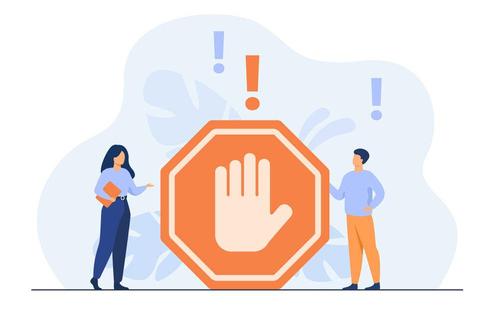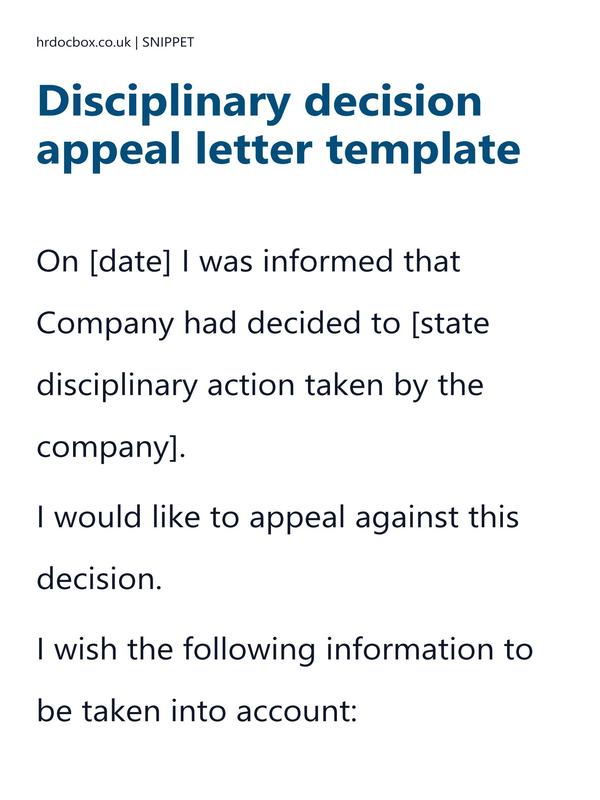Disciplinary decision appeal letter template


Our Disciplinary Decision Appeal Letter Template supports fair processes, providing a platform for employees to address concerns and seek resolution.
- Includes Disciplinary decision appeal letter template, plus 12 months’ access with all updates provided free of charge and notified to you.
- UK-specific accuracy.
- 62 words over 1 page.
- Last updated 26/12/2025.
- Format: Word / plain text / email.
- Delivery: Instant download after purchase (no physical item).
- Access: Download link shown here after checkout.
- This Disciplinary decision appeal letter template will SAVE you up to 30 mins drafting & research. Save cost. Reduce risk.
[Sender name]
[Sender address]
[date]
[Recipient name]
[Recipient address]
Dear [Recipient first name],
Appeal against [verbal | first | final][ written] warning
On [date] I was informed that Company had decided to [state disciplinary action taken by the company].
I would like to appeal against this decision.
I wish the following information to be taken into account:
- [State reasons, mitigation, justification, etc.]
Please reply within 14 days from the date of this letter to confirm the proposed date for the appeal hearing.
Yours [faithfully | sincerely],
[Sender name]
[Sender job title]
[Sender telephone]
[Sender email]
[For, and on behalf of [Company name] ]
Disciplinary decision appeal letter template purpose
A disciplinary decision appeal letter is a written communication that an employee sends to their employer to appeal a disciplinary action that has been taken against them. The letter typically outlines the employee's reasons for disagreeing with the decision and provides additional information or evidence to support their case.
In the appeal letter, the employee may request a review of the disciplinary action, such as a reduction in the severity of the punishment or a reversal of the decision altogether. The letter may also request a meeting with the employer to discuss the situation further and present additional evidence or arguments.
When writing a disciplinary decision appeal letter, it is important to remain professional and respectful in tone. The letter should clearly outline the grounds for the appeal and provide any relevant documentation or evidence to support the appeal. The employee should also clearly state the outcome they are seeking and any steps they are willing to take to resolve the issue.
In some cases, an organisation may have a formal process for filing an appeal, including specific guidelines for the content and format of the appeal letter. In other cases, the employee may need to follow less formal procedures, such as submitting the appeal letter to their supervisor or HR representative.
Overall, a disciplinary decision appeal letter is an important tool for employees who believe that they have been unfairly disciplined and wish to challenge the decision.
Practical application of a Disciplinary decision appeal letter template
- The Disciplinary decision appeal letter template should be actioned / delivered within the timescale set out in the disciplinary decision letter..
- It is sent / delivered by an employee to an employer / HR team.
Compliance
Compliance
This Disciplinary decision appeal letter template incorporates relevant UK laws and HR standards, including those listed below:
-
Employment Rights Act 1996: Provides guidelines on the right for employees to appeal disciplinary decisions.
-
Equality Act 2010: Ensures fair treatment during the appeal process, prohibiting discrimination based on protected characteristics.
-
ACAS Code of Practice on Disciplinary and Grievance Procedures: Offers best practices for handling disciplinary issues, including the right to appeal decisions.
-
Data Protection Act 2018: Ensures that employee data related to disciplinary appeals is handled securely and confidentially.
Disciplinary decision appeal workflow
Disciplinary decision appeal workflow
Check which resources should be implemeted before and/or after the Disciplinary decision appeal letter template, to understand the workflow.
Disciplinary appeal hearing invitation letter
Our Disciplinary Appeal Hearing Invitation Letter Template facilitates transparent communication, ensuring a structured process for appeal hearings.
Frequently Asked Questions about a Disciplinary decision appeal letter template
Frequently Asked Questions about a Disciplinary decision appeal letter template
-
Can I use the Disciplinary decision appeal letter template in my small business?
Yes. The Disciplinary decision appeal letter template is designed to be flexible and suitable for organisations of all sizes, including small businesses and charities. It follows UK employment law best practice, so even if you don't have an in-house HR team, you can confidently apply it.
-
Is the Disciplinary decision appeal letter template compliant with 2026 UK employment law?
Absolutely. Like the Disciplinary decision appeal letter template, all of our templates are drafted with the latest ACAS guidance and UK employment legislation in mind. We review and update them regularly, so you can be confident they remain compliant.
-
Can I customise the Disciplinary decision appeal letter template for my organisation?
Yes, we highlight the areas of the Disciplinary decision appeal letter template that you need to update with your own details, and where you need to make decisions to suit your situation. This saves you time and ensures that you meet best practice.
-
Do I get instant access to the Disciplinary decision appeal letter template?
Yes. Once purchased, you'll be able to download the Disciplinary decision appeal letter template instantly. Templates are provided in editable Word or Excel format so you can customise them easily, and in PDF format for easy sharing.
-
What if I need more help, not just a Disciplinary decision appeal letter template?
If you're looking for broader support, we also offer toolkits and library bundles that include the Disciplinary decision appeal letter template, along with other HR templates and policies for fully managing your situation. These may be more cost-effective if you need deeper advice.
-
Why should I use this Disciplinary decision appeal letter template, and not AI to generate it?
The risk of using a free AI-generated template 'without review' includes your legal exposure, missing context, and no awareness of the wider process, whereas purchasing the Disciplinary decision appeal letter template from us mitigates that risk.
